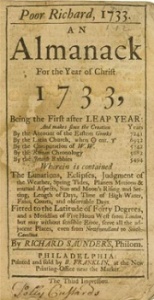Poor Richard’s Almanac
Listen to the Recess! Clip
| Author | Rita Smith |
| Air Date | 12/28/1999 |

Poor Richard’s Almanac Transcript
Benjamin Franklin’s Poor Richard’s Almanac made its first appearance in print on this date in 1732. Franklin saw the Almanac as an opportunity for educating the public, both children and adults, because both read them, and he considered it, as he wrote in his autobiography, “a proper vehicle for conveying instruction among the common people.” Books were generally expensive in Colonial America and the average New England household library would have consisted of only the Bible, a New England Primer and an almanac. Poor Richard’s Almanac was a miscellany filled with a wide variety of information and entertainment. There was the usual calendar of days, weather forecasts, and agricultural advice, but it also contained medical advice, lists of public officials, biographies, essays, poetry, humor, and predictions on many topics. In the first edition, in fact, Franklin predicted the death date of a rival almanac publisher. It didn’t happen, of course, when Franklin said it would. The most popular feature of the Almanacs were the sayings of Poor Richard, those wise, witty and memorable phrases which were scattered throughout each edition. Franklin’s hope in including these sayings was that they would inspire people to hard work which would lead to enough wealth that people could afford to be good. “I filled all the little spaces,” he writes in his Autobiography,” that occurr’d between the remarkable days in the calendar with proverbial sentences, chiefly such as inculcated industry and frugality as the means of procuring wealth, and thereby securing virtue; it being more difficult for a man in want, to act always honestly.”
In the 1758 edition of the Almanac, now entitled Poor Richard Improved, Franklin pulled together many of the proverbs from the preceeding twenty five issues and published them in an essay. The reprints of this essay were widely circulated throughout America, Europe and Great Britain and, according to one recent writer, some people thought that the industry and frugality championed in this pamphlet accounted for the growing availability of money which was observable for several years after its publication.1
Most of the proverbs were not original with Franklin. He gathered them from his wide reading and travels, but he made no apologies for this, asking, Why should I give my readers bad lines of my own, when good ones of other people are so plentiful? (1748 almanac, quoted in Stowell) Here are some of these “good lines” which, after 260 years, continue to be a part of the everyday language of Americans.
Fish and visitors smell in three days
A penny saved is a penny earned
Little strokes fell great oaks
Genius without education is like silver in the mine
God helps them that help themselves
Haste makes waste
Kill no more pigeons than you can eat
Never confuse motion with action
The sleeping fox catches no poultry
Three may keep a secret if two of them are dead
To lengthen thy life, lessen thy meals
Well done is better than well said
Sources:
1 Stowell, Marion Barber. Early American Almanacs: The Colonial Weekday
Bible. New York. Burth Franklin. 1977.